Libraries make vast repositories of knowledge easily accessible. They overflow with possibilities and potential.
The same could be said of CSL’s human antibody library, developed by CSL scientists. Using this promising research resource, CSL is collaborating with WEHI (Walter and Eliza Hall Institute of Medical Research) to fast-track the discovery of antibody medicines.
CSL scientists were able to isolate more than 100 billion natural human antibody sequences from human immune cells, yet this unusual library is physically much smaller than the kind that holds books.
“The full antibody library is encoded in DNA and fits into a tiny volume – less than a 50th of a teaspoon. This means the entire library can fit neatly inside one test tube in the lab, where future antibody medicines start their journey,” says Dr. Mark Liddament, Head of Molecular Biology, CSL.
CSL’s human antibody library is the engine room of the new Centre for Biologic Therapies in Australia, a collaboration between CSL and WEHI that was announced in 2021. The Centre combines WEHI’s expertise in immunology, cancer, inflammatory disorders and infectious diseases with CSL’s experience in drug discovery and development.
“CSL’s antibody library will be the key platform technology used at the Centre and, importantly, the collaboration between the two organizations, the knowledge transfer and the sharing of assets, resources and facilities will be of significant value,” Liddament said.
The Centre for Biologic Therapies officially opened in May 2023 and its aim is to generate high-quality antibody medicines against novel targets in human disease.
“The Centre is part of WEHI’s commitment to collaborative, innovative research for discovery and translation to improve disease prevention, diagnosis and treatment,” said Professor Wai-Hong Tham, Co-Chair of the WEHI Biologics Initiative.
How could the antibody library help develop medicines? First, it helps to know something about antibodies, which are blood proteins that are produced when your body mounts an immune response, neutralizing viruses, bacteria and other sources of infection in the body.
Without antibodies, humans can’t effectively fight off dangerous infections and diseases. Having a library of human antibodies gives scientists a way to rapidly identify which human antibodies are effective as potential medicines. Knowing which antibodies neutralize a virus, for instance, can help determine how to respond with vaccines and medicines, such as antivirals and monoclonal antibodies.
In the lab, an iterative funneling approach is used to identify antibodies from the library that are fit to become medicines. Clinical studies would come later to answer critical questions about whether the antibody is safe for humans and whether it works effectively to treat disease.



